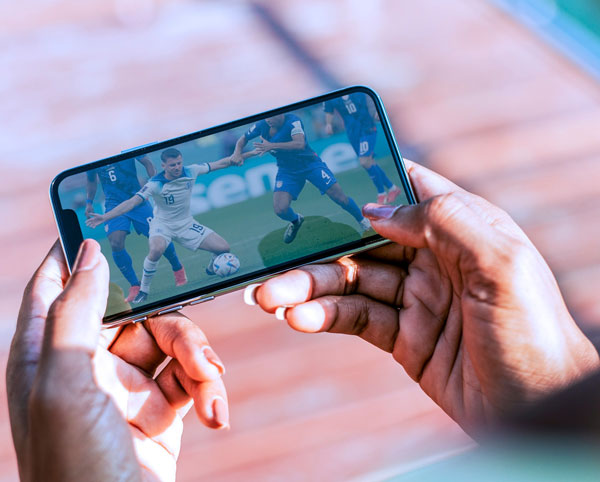
African football fans are keeping up with the World Cup 2022 games from their mobile devices on the back of rapid smartphone penetration, high-speed internet and increased VPN usage on the continent.
Doha, Qatar | BIRD AGENCY | Sports content is being democratised in Africa with more bespoke over-the-top (OTT) platforms streaming live matches to millions of smartphone users in the continent. This year’s World Cup is driving a seemingly unstoppable trend.
OTT is a media service offered directly to viewers via the internet, bypassing cable, broadcast, and satellite television platforms.
With the deployment of powerful broadband connections, football fans are watching their favourite teams play any time, on any device, on the go or at home.
Consumers are set to be treated to even more high-resolution video streaming with the rollout of 5G, while fast-growing fibre optic networks are also bringing high-speed internet to African homes.
While real disruption of traditional platforms by streaming services in Africa began over the last decade, sports offering remained largely the terrain of established Pay-TV firms like MultiChoice.
In 2017, MultiChoice, which runs DStv and GOtv, said it had lost more than 100,000 premium subscribers to “unregulated competition” from streaming services such as Netflix and Amazon.
It revealed this in submissions to the Independent Communications Authority of South Africa (Icasa), which was conducting an enquiry into subscription TV broadcasting services at the time.
Fast forward to 2022 and MultiChoice has pivoted from its infamous decoder-first policy and joined the competition with its DSTV Now, a mobile and web-based streaming service.
ShowMax Pro, another MultiChoice platform, also comes with live sports content, including athletics and football action from the Premier League, Series A, PSL, Champions League, and La Liga games, in addition to movies and music.
Deon Pinetown, vice president for Africa at PM Connect, asserts that Africa is the new frontier for sports rights holders.
“While the direct-to-consumer (DTC) sports OTT market is on a huge upward trajectory globally, emerging markets are spearheading this growth and Africa is at the heart of that,” he told SportsPro Media.
“Why is this significant for sports OTT? Mobile is not only the first screen for sports fans in Africa and similar emerging markets, but in many cases, it is the only screen for them to watch their favourite team. Mobile penetration massively exceeds that of TV, which still sits at less than 50 per cent penetration of all households in Africa.”
Chinese electronics and media company, StarTimes, through its bespoke StarTimes App, has also become a favourite platform for sports lovers.
Live sports content on the app includes Bundesliga, UEFA Europa League, French Ligue 1, ESPN, and MMA (One Championship). It allows users to pay for daily, weekly, and monthly access to the service.
Qatari media group beIN, with its beIN Sports offering, has become a hit, especially in North Africa, offering a banquet of Premier League action, Ligue 1, La Liga, Serie A and Major League Soccer.
Sports lovers in Africa are also sidestepping content curbs, accessing matches via the Virtual Private Network (VPN).
Meanwhile, Research and Markets figures show African OTT movie and TV episode revenues will reach US$2 billion by 2027 – tripling from US$623 million in 2021.
South Africa and Nigeria will account for 56 per cent of the total by 2027, leaving US$ 896 million divided between 33 other countries. SVOD (subscriber video on demand) revenues will reach US$1.66 billion by 2027, up from US$476 million in 2021.
The rise of digital media players, such as Netflix, Hulu, Amazon, Apple TV, Roku, and Boxee, is challenging the traditionally maintained supremacy of television as the main entertainment hub in African homes.
With increased digital media consumption, investors across the media and entertainment value chain are adopting new strategies and testing newer models of media consumption to tap into the market.
After initial hesitation, more commercial entities are increasing their advertising budgets to digital media platforms, including mobile-based.
On sports, Pinetown notes that phones are used by African consumers as the de facto device to pay for products and services, including M-Pesa, a plethora of mobile money wallets and direct carrier billing (DCB) via mobile networks.
“DCB mobile payments are particularly powerful when paired with content, as consumers can simply subscribe to or purchase a product by adding the cost to their phone bill or using their pay-as-you-go pre-paid phone credit,” he said.
*****
SOURCE: Seth Onyango, bird story agency
 The Independent Uganda: You get the Truth we Pay the Price
The Independent Uganda: You get the Truth we Pay the Price



